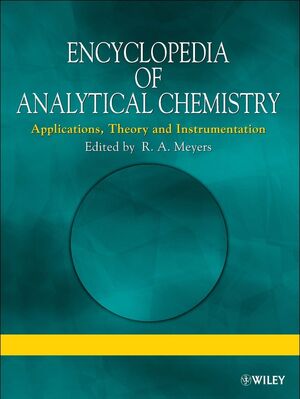Encyclopedia of Analytical Chemistry: Applications, Theory and Instrumentation, Supplementary Volumes S1 - S3ISBN: 978-0-470-97333-2
Hardcover
2188 pages
March 2011
 |
||||||
Provides essential information required to analyze elements and compounds as well as structures in a wide variety of matrices for a range of applications, interpret the results and also gain a thorough knowledge of the theory and instrumentation utilized.
Visit the Encyclopedia of Analytical Chemistry online to view the latest articles available within the most comprehensive one-stop reference for analytical chemistry.
Coverage of key advances within this 3-Volume set includes:
- Proteomics and genomics
Coverage of quantitative proteomics, electrochemical detection, dynamic light scattering, amyloids and protein aggregation measurements to low-cost, high-throughput gene sequencing
- Imaging technologies
Coverage of major new medical and biological techniques including: ultrashort laser pulse medical imaging, quantitative imaging of membrane mechanics with molecular resolution, 3D neutron imaging, scanning near-field ultrasound holography, atomic force microscopy in nanocell biology, biomolecular interactions using nanopore force spectroscopy, scanning electrochemical microscopy and quadrupolar nuclei in biological systems
- Nanotechnology
Expanded coverage of nanotechnology including scanning probe microscopy for imaging nanoparticles and nanocrystals, nanomaterials for electroanalysis, as well as scanning electrochemical microscopy, and scanning near-field ultrasound holography
- Other major advances
There is also comprehensive coverage of advances in environmental monitoring, drinking water analysis, forensic science, electronic absorption and luminescence spectroscopy, infrared spectroscopy, atomic spectroscopy, nuclear magnetic resonance and electrochemistry; as well as specific coverage in pharmaceuticals and drugs, clinical chemistry, X-ray spectrometry, chemometrics, polymers and liquid chromatography
Written at a level appropriate to allow a chemist (organic, polymer, inorganic, biochemist, molecular biologist), physicist or engineer to discover methodology for the analysis of most molecular and biological structures and materials.
Find out more about EAC Online here: http://tiny.cc/eaconline



